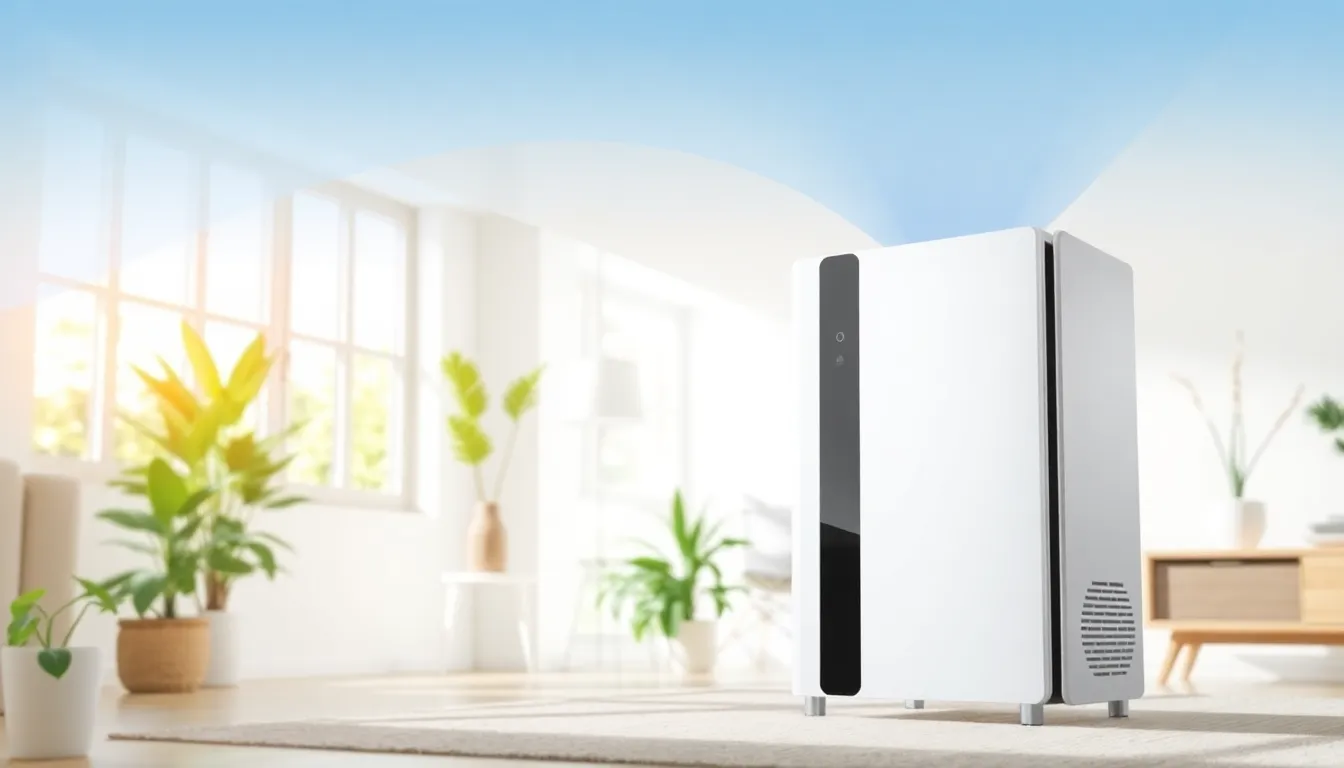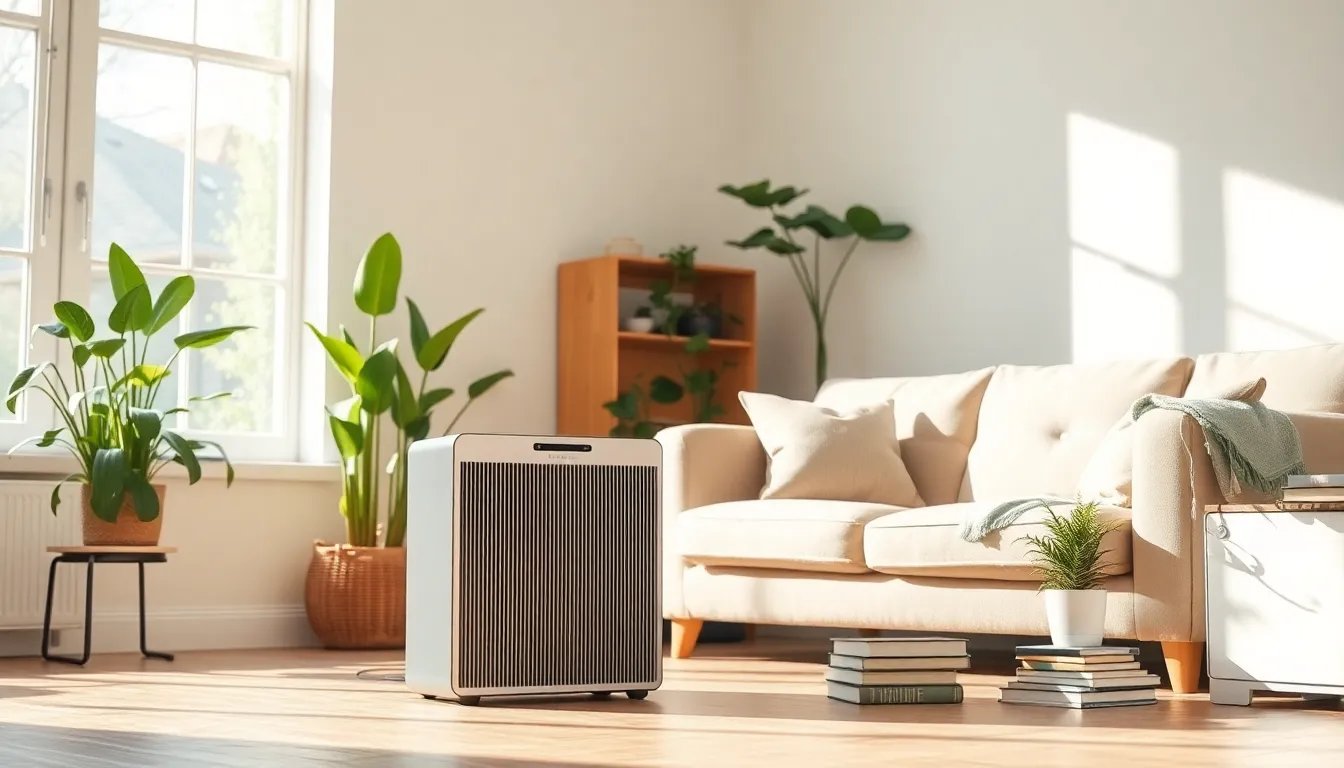Table of Contents
ToggleAllergies can feel like an unwelcome guest that just won’t leave, sneezing and sniffling through every season. With pollen, dust, and pet dander lurking around every corner, finding relief can seem like a full-time job. Enter the air purifier, the superhero of indoor air quality, ready to tackle those airborne villains with a high-efficiency filter and a powerful fan. But do they really live up to the hype, or are they just fancy machines collecting dust?
Many people swear by their air purifiers, claiming they’ve transformed their homes into allergy-free sanctuaries. But what’s the real deal? Can these gadgets truly help combat allergy symptoms, or are they just blowing hot air? Let’s dive into the science and see if investing in one of these devices is the secret weapon against allergies everyone’s been raving about.
Understanding Allergies
Allergies arise when the immune system reacts to specific substances. Identifying allergens helps in managing allergy symptoms effectively.
Types of Allergens
Common allergens include pollen, dust mites, pet dander, mold, and certain foods. Pollen from trees, grasses, and weeds often triggers seasonal allergies. Dust mites thrive in household environments, especially in bedding and upholstery, causing persistent issues. Pet dander, comprised of tiny skin flakes, can provoke allergic reactions in sensitive individuals. Mold spores, prevalent in damp areas, contribute to indoor allergy problems. Food allergens, such as peanuts and shellfish, cause reactions in susceptible people.
Symptoms of Allergies
Symptoms of allergies vary among individuals but often include sneezing, runny or stuffy nose, itchy eyes, and skin rashes. Nasal congestion can impede daily activities, impacting overall quality of life. Itchy skin and hives result from direct contact with allergens. Breathing difficulties may occur in severe cases, especially for individuals with asthma. Recognizing these symptoms is crucial for timely intervention and treatment.
Functionality of Air Purifiers

Air purifiers significantly improve indoor air quality, making them valuable for allergy sufferers. These devices capture harmful particles, reducing exposure to allergens.
How Air Purifiers Work
Air purifiers operate by drawing in air and filtering out pollutants. HEPA filters, often used in these devices, trap 99.97% of particles as small as 0.3 microns. They capture dust, pollen, pet dander, and other allergens effectively. Additionally, activated carbon filters absorb odors and volatile organic compounds. Through this filtration process, air purifiers provide cleaner air that supports allergy symptom relief.
Types of Air Purifiers
Several types of air purifiers exist, each designed for specific needs. HEPA air purifiers focus on trapping particulates, ideal for allergy relief. Activated carbon purifiers excel at odor removal, enhancing indoor freshness. UV air purifiers use ultraviolet light to eliminate bacteria and viruses, contributing to a healthier environment. Ionizers release negatively charged ions that attract and neutralize pollutants. Understanding these differences helps consumers choose the right air purifier for allergy management.
Evidence on Air Purifiers and Allergies
Research indicates that air purifiers can provide relief for allergy sufferers by improving indoor air quality. They work by trapping allergens and reducing airborne particles that trigger symptoms.
Studies Supporting Air Purifiers
Numerous studies support the effectiveness of air purifiers in reducing allergy symptoms. A 2015 study published in the Journal of Allergy and Clinical Immunology found that HEPA filters significantly decreased indoor dust and pollen levels. Participants reported notable improvements in respiratory health when using air purifiers consistently. Similarly, a 2021 study in Environmental Pollution highlighted air purifiers’ ability to filter out pet dander, resulting in reduced allergen exposure and enhanced well-being.
Limitations and Counterarguments
Some research points out limitations of air purifiers. They do not eliminate all allergens present in an environment. While air purifiers reduce airborne particles, they may not address allergens stuck to surfaces like carpets and furniture. Critics argue that relying solely on air purifiers may lead individuals to neglect other allergy management strategies, such as regular cleaning and maintaining low humidity levels. Despite these concerns, many allergy sufferers find air purifiers beneficial as part of a comprehensive approach to managing symptoms.
Choosing the Right Air Purifier
Selecting an effective air purifier can greatly enhance indoor air quality for allergy sufferers. Understanding the key features ensures a practical choice.
Key Features to Consider
When choosing an air purifier, prioritize HEPA filters, known for capturing 99.97% of particles as small as 0.3 microns. Look for Activated Carbon filters that absorb odors and volatile organic compounds. Size matters; select a unit suitable for the room’s square footage to maximize efficiency. Consider noise levels, especially for bedrooms, and ensure the model has a clean air delivery rate that meets your needs. Additional features might include smart sensors for air quality monitoring and filter replacement indicators for maintenance ease.
Recommended Products
The following air purifiers receive high marks for allergy relief. The Coway AP-1512HH is praised for its HEPA filtration and compact design, suitable for medium-sized rooms. The Honeywell HPA300 offers a powerful clean air delivery rate, ideal for larger spaces. For those seeking advanced technology, the Dyson Pure Cool combines air purification with cooling functionality. The LEVOIT Core 300 stands out for its affordability while still providing effective filtration. Each of these options helps reduce allergens and improves indoor air quality efficiently.
Air purifiers can be a valuable tool for those struggling with allergies. By effectively capturing allergens and improving indoor air quality, they offer significant relief from common allergy symptoms. While they may not eliminate every allergen present, their ability to reduce airborne particles can lead to noticeable improvements in well-being.
Choosing the right air purifier tailored to specific needs is essential. With options ranging from HEPA filters to activated carbon, individuals can find a solution that best fits their living environment. Integrating air purifiers into a broader allergy management plan can enhance their effectiveness, making it easier for allergy sufferers to breathe easier and enjoy a better quality of life.




